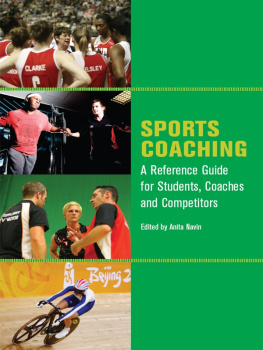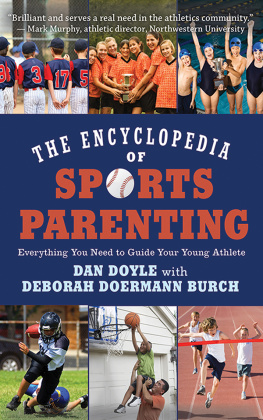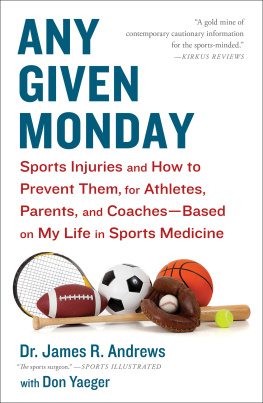Parenting Young Athletes
Parenting Young Athletes
Developing Champions in Sports and Life
Frank L. Smoll and Ronald E. Smith
ROWMAN & LITTLEFIELD PUBLISHERS, INC.
Lanham Boulder New York Toronto Plymouth, UK
Published by Rowman & Littlefield Publishers, Inc.
A wholly owned subsidiary of The Rowman & Littlefield Publishing Group, Inc.
4501 Forbes Boulevard, Suite 200, Lanham, Maryland 20706
www.rowman.com
10 Thornbury Road, Plymouth PL6 7PP, United Kingdom
Copyright 2012 by Rowman & Littlefield Publishers, Inc.
All rights reserved . No part of this book may be reproduced in any form or by any electronic or mechanical means, including information storage and retrieval systems, without written permission from the publisher, except by a reviewer who may quote passages in a review.
British Library Cataloguing in Publication Information Available
Library of Congress Cataloging-in-Publication Data
Smoll, Frank L.
Parenting young athletes : developing champions in sports and life / Frank L. Smoll and Ronald E. Smith.
p. cm.
Includes bibliographical references and index.
ISBN 978-1-4422-1820-8 (cloth : alk. paper) ISBN 978-1-4422-1822-2 (electronic)
1. Sports for children. 2. Parent and child. 3. Parenting. 4. Coaching (Athletics) I. Smith, Ronald Edward, 1940 II. Title.
GV709.2.S55 2012
796.083dc23
2012017126
 The paper used in this publication meets the minimum requirements of American National Standard for Information SciencesPermanence of Paper for Printed Library Materials, ANSI/NISO Z39.48-1992.
The paper used in this publication meets the minimum requirements of American National Standard for Information SciencesPermanence of Paper for Printed Library Materials, ANSI/NISO Z39.48-1992.
Printed in the United States of America
You and Your Child in Sports
Sanity and Madness in Competition
Dear Mom and Dad,
Im writing this letter because youve always told me to tell you if anything was bothering me. This has been on my mind for a while, but I havent been able to get myself to talk about it.
Remember the other night when my team was playing and you were sitting and watching? Well, I hope you wont get mad at me, but you kind of embarrassed me. Remember when I struck out with the bases loaded? I felt really bad about that, but even worse when I heard you yelling at the umpire. Actually, the pitch was a strike, but that pitcher is so fast I just couldnt swing. Then later in the game when the coach took me out in the fourth inning so Danny could play, I really feel bad that you got down on him because hes trying to do a good job. He really loves baseball and loves coaching us kids.
Dad, I know you want me to be a good ballplayer like you were, and I really do try as hard as I can. But I guess I just cant measure up to what you want me to be. The way you act when I dont do good, it makes me feel like Ive let you down. On the way home the other night, neither of you spoke to me. I guess you were pretty sore at me for messing up. You made me feel like I never wanted to play baseball again.
Even though Im not very good, I love to play and its lots of fun being with the other kids. But it seems like the only time youre happy is when I do really goodeven though you told me that playing sports was supposed to be for fun and to learn the game. I want to have fun, but you keep taking the fun away. I didnt know you were going to get so upset because I couldnt become a star.
This is really hard to say, and thats why I have to write it to you. I used to be really happy that you came to our games. Some of the kids parents never show up. But maybe it would be better if you stopped coming so I wouldnt have to worry about disappointing you.
Love,Chris
Chriss letter leaves little doubt that his parents are having a real impact on his youth sport experience. Unfortunately, it is not the kind of effect that one would wish for him. Perhaps Chriss parents are lucky, for their son has the courage to give them feedback on something that is bothering him deeply and influencing his enjoyment of sports. Maybe they can change their behavior, after realizing how they are unintentionally becoming a source of stress rather than a source of support. Like all parents, they want the best for their child, and they may honestly feel that they are supporting him in his sport activities. It also seems clear that there needs to be a change in their attitudes and behavior, if sports are to bring Chris and his parents closer together and his parents are to contribute to his enjoyment of the activity.
This book is for you, the parent of the young athlete. We wrote it because we believe that sport participation has great potential for improving the growth and personal development of children and for enriching the family. Because sports are so important to youngsters, what parents do and say in relation to athletics can have an important long-term impact. This book provides information that will help you make your childs sport experience constructive and enjoyable!
Parents can be a source of support, or they can create stress for young athletes.
All parents do as well as they can, within the limits of their awareness. We believe that the information in these pages will increase your awareness of, and help you deal more effectively with, the many problems and opportunities that can arise in youth sports. We welcome the opportunity to increase the knowledge of parents who have a strong background in sports as well as those who have relatively little athletic experience.
The Growth of Youth Sports
How big are youth sports, and how did they get that way? Sports for children and adolescents in the United States actually go back to the early 1900s. The first programs were established in public schools when it was recognized that physical activity was an important part of education. Over time, sponsorship and control of some sports have shifted to a variety of local and national youth agencies. These programs have flourished, and today more children are playing than ever before.
Youth sports are deeply rooted in our social and cultural heritage.
How fast have youth sports grown? Very fast! Little League Baseball, one of the oldest programs, is a good example. It originated in 1939 in Williamsport, Pennsylvania, as a three-team league for 8- to 12-year-old boys. The program was so popular that it spread rapidly. In its 50-year anniversary season, there were some 6,800 chartered leagues in 25 countries. Little League now encompasses a huge patchwork of nations and cultures, including Israel, Jordan, Russia, Germany, Japan, Canada, Australia, Poland, Mexico, China, Venezuela, and South Africa. As of the 2008 season, nearly 2.6 million 6- to 18-year-old boys and girls participated in Little League Baseball worldwide, including approximately 400,000 boys and girls registered in Little League Softball.
An amazing number of youngsters participate in sports.
Programs in other sports have also shown rapid growth. Today more opportunities to play a greater variety of sports exist than ever before, particularly for girls and young women. Current estimates indicate that more than half (approximately 68 million) of the young people in the 6-to-18-year age range participate in agency-sponsored sports (e.g., Little League Baseball, American Youth Soccer Organization, Boys and Girls Clubs) and in school-sponsored athletics. This situation has required the involvement of increasing numbers of adults. Accordingly, millions of men and women volunteer their time as coaches, league administrators, and officials. And millions more serve as paid professionals in school-sponsored athletics. As programs have become more highly organized, parental involvement has also increased. Thus, in moving from sandlots and playgrounds to the more formalized organizations that now exist, the youth sport explosion has touched young people and adults in escalating numbers.









 The paper used in this publication meets the minimum requirements of American National Standard for Information SciencesPermanence of Paper for Printed Library Materials, ANSI/NISO Z39.48-1992.
The paper used in this publication meets the minimum requirements of American National Standard for Information SciencesPermanence of Paper for Printed Library Materials, ANSI/NISO Z39.48-1992.